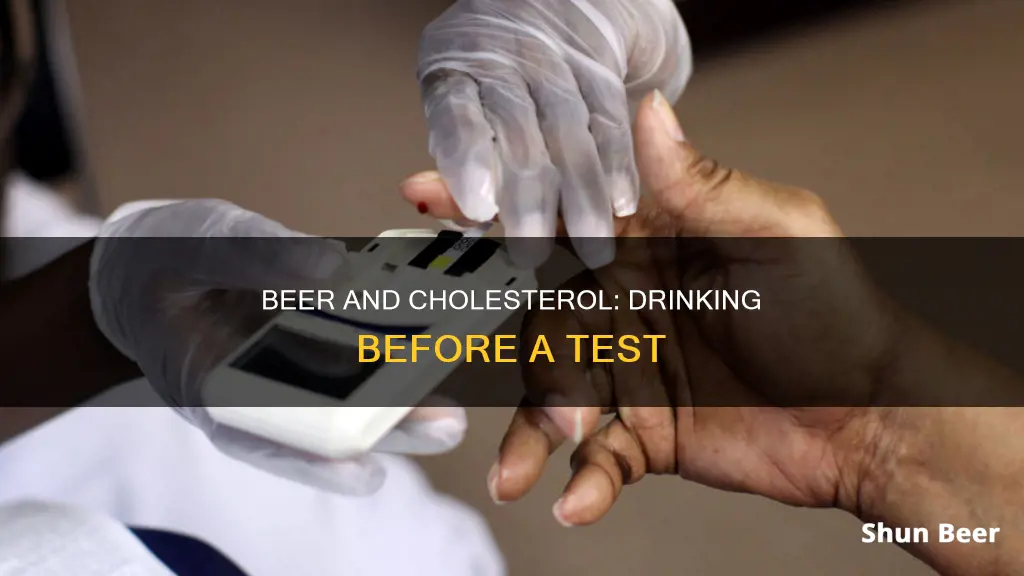
Beer is a popular alcoholic beverage, favoured by 43% of Americans who drink alcohol. But what effect does it have on your cholesterol levels? Beer doesn't contain any natural cholesterol, but it can raise your triglyceride levels, which are a type of fat that contributes to your total cholesterol count. So, can you drink beer before a cholesterol test? Most experts advise that you avoid alcohol for 24 hours before your test, as it can negatively affect your cholesterol scores.
| Characteristics | Values |
|---|---|
| Can drinking beer affect cholesterol levels? | Yes, beer can raise your triglyceride levels. |
| Does beer contain cholesterol? | No, beer does not contain any natural cholesterol. |
| Can drinking beer lower cholesterol? | No, beer does not lower cholesterol. |
| Can drinking beer before a cholesterol test affect the results? | Yes, alcohol consumption can affect cholesterol test results. It is recommended to avoid alcohol for 24 hours before the test. |
What You'll Learn
- Beer doesn't contain natural cholesterol but it can raise triglyceride levels
- HDL cholesterol is raised by light to moderate alcohol consumption
- Heavy drinking increases total cholesterol, LDL, and triglycerides
- Alcohol is broken down in the liver and reconstructed as cholesterol and triglycerides
- HDL cholesterol, or good cholesterol, should be greater than or equal to 60 mg/dL

Beer doesn't contain natural cholesterol but it can raise triglyceride levels
It's a common misconception that drinking alcohol can improve your cholesterol levels and heart health. While light to moderate alcohol intake may not harm your cholesterol levels, heavy drinking can have severe effects on your health. Beer, by itself, does not contain any natural cholesterol. However, it can still negatively impact your health by raising your triglyceride levels.
Triglycerides are a type of fat in the blood that your body uses for energy. Ideally, your triglyceride level should be below 150 milligrams per decilitre (mg/dL). Beer contains carbohydrates and alcohol, two substances that can quickly raise triglyceride levels. Since triglycerides are part of the total cholesterol count, an increase in triglycerides will also lead to an increase in total cholesterol. People who are more sensitive to the effects of beer may experience even higher levels of triglycerides.
While beer doesn't contain natural cholesterol, it does contain cholesterol-binding sterols, such as sitosterol and ergosterol. These sterols are plant compounds that help remove cholesterol from your body. However, the levels of these sterols in beer are too low to have a significant impact on reducing cholesterol.
It's important to note that excessive alcohol consumption can increase your risk of heart disease, stroke, high blood pressure, obesity, and high triglyceride levels. Therefore, it's recommended to drink in moderation, which is one drink per day or less for women and two drinks per day or less for men. If you're concerned about your cholesterol levels or alcohol intake, it's best to consult a healthcare professional for advice and guidance.
Beer and Cider: Perfect Pairing or Poor Mix?
You may want to see also

HDL cholesterol is raised by light to moderate alcohol consumption
Beer is a popular alcoholic beverage, but does drinking it affect your cholesterol levels? Well, it's a bit of a mixed bag. Beer doesn't contain any natural cholesterol, but it does contain carbohydrates and alcohol, which can raise triglyceride levels. Triglycerides are a type of fat that contributes to your total cholesterol count. So, while beer may not directly increase your cholesterol, it can impact the overall cholesterol balance in your body.
Now, let's focus on HDL cholesterol, the "good" type of cholesterol. HDL stands for high-density lipoprotein and it plays a crucial role in maintaining a healthy cholesterol balance. It does this by carrying cholesterol from other parts of your body back to the liver, which then removes it from your body. So, what's the relationship between HDL cholesterol and beer?
Some studies suggest that light to moderate alcohol consumption may have a positive impact on HDL cholesterol levels. For example, a study on mice showed that moderate beer consumption could reduce cholesterol in the liver and cholesterol deposits in the aorta, the largest artery in the body. Additionally, some unidentified components in beer may change how lipoproteins are metabolized, potentially reducing the risk of heart disease. However, it's important to note that these components and their mechanisms are not yet fully understood.
While light to moderate alcohol consumption may have potential benefits on HDL cholesterol, excessive drinking can have negative consequences. Excessive alcohol intake can increase the risk of heart disease, stroke, high blood pressure, obesity, and elevated levels of triglycerides. It can also lead to heart muscle disease, irregular heartbeat, and congestive heart failure over time. Therefore, it's crucial to drink in moderation, which is generally defined as one drink per day for women and two drinks per day for men.
In conclusion, while light to moderate beer consumption may have a positive impact on HDL cholesterol levels, it is not a direct or significant contributor. To effectively raise HDL cholesterol and maintain a healthy cholesterol balance, a well-rounded approach is necessary. This includes a healthy diet, regular exercise, maintaining a healthy weight, and managing other lifestyle factors such as smoking and diabetes.
Hoppy Beers: The Secret to Better Beer Bread?
You may want to see also

Heavy drinking increases total cholesterol, LDL, and triglycerides
It is generally not recommended to drink beer before a cholesterol test. While a glass or two of red wine each day has been found to help reduce the risk of heart disease, the news about alcohol is not entirely positive.
People who drink heavily tend to have very high triglyceride levels, which can increase the risk of diabetes, pancreatitis, and stroke. Triglycerides are a type of fat that is part of the total cholesterol count. Therefore, if your triglyceride levels increase, your total cholesterol increases as well. Ideally, your triglyceride level should be below 150 milligrams per deciliter (mg/dL).
In addition to increasing triglyceride levels, heavy drinking can also lead to an increased risk of heart disease and stroke, high blood pressure, obesity, and irregular heartbeat (arrhythmia). It can also contribute to an inactive lifestyle, which can create further health problems.
To improve your cholesterol levels, it is recommended to get regular exercise and follow a diet that is low in simple sugars and alcohol. Cutting down on alcohol can help lower your cholesterol levels and improve your heart health.
Krups Beertender: Compatible With Other Beers?
You may want to see also

Alcohol is broken down in the liver and reconstructed as cholesterol and triglycerides
Alcohol is a toxin that must be neutralised or eliminated from the body. The liver is the primary organ responsible for this detoxification process. Liver cells produce the enzyme alcohol dehydrogenase (ADH) which breaks alcohol down into acetaldehyde. This is then further broken down into acetate by another enzyme, aldehyde dehydrogenase (ALDH). Finally, the acetate is further metabolised and leaves the body as carbon dioxide and water.
However, the breakdown of alcohol by the liver can also result in the generation of cholesterol and triglycerides. Acetate, produced from the oxidation of acetaldehyde, is oxidised to carbon dioxide. But most of the acetate escapes the liver and enters the bloodstream, where it is metabolised into acetyl CoA. Acetyl CoA is involved in lipid and cholesterol biosynthesis in the mitochondria of peripheral and brain tissues.
In addition, alcohol consumption can increase the levels of fats called triglycerides in the blood. Beer, in particular, raises triglyceride levels because it contains carbohydrates and alcohol, two substances that increase triglycerides quickly. Since triglycerides are part of the total cholesterol count, an increase in triglycerides leads to an increase in total cholesterol.
Therefore, while alcohol is not directly reconstructed as cholesterol and triglycerides, its breakdown in the liver can lead to increased levels of these substances in the body.
The Great American Beer Festival: What's on Tap?
You may want to see also

HDL cholesterol, or good cholesterol, should be greater than or equal to 60 mg/dL
While there is no direct answer to the question of whether one can drink beer before a cholesterol test, it is important to understand the impact of alcohol on cholesterol levels. Beer, in particular, has been a subject of interest due to its popularity and potential health effects.
When doctors talk about cholesterol, they are referring to two main types: HDL (high-density lipoprotein) and LDL (low-density lipoprotein) cholesterol, along with triglycerides, a type of fat. HDL cholesterol is often referred to as "good" cholesterol because it helps protect against heart attacks and strokes. It does so by absorbing excess LDL cholesterol from the blood and carrying it back to the liver for breakdown and excretion.
Maintaining a healthy level of HDL cholesterol is important for maintaining cardiovascular health. According to medical sources, an HDL cholesterol level of 60 mg/dL or higher is considered desirable. This is because higher HDL levels are associated with a reduced risk of heart disease and stroke. HDL cholesterol helps to counteract the negative effects of LDL cholesterol, which is the "bad" form that contributes to fatty buildups in arteries (atherosclerosis).
Regarding the impact of beer consumption on cholesterol, it is important to note that beer does not contain any natural cholesterol. However, it can still influence cholesterol levels indirectly. Beer contains carbohydrates and alcohol, which can lead to an increase in triglyceride levels. Since triglycerides are part of the total cholesterol count, elevated triglycerides can result in higher total cholesterol levels. Therefore, excessive beer consumption may indirectly contribute to higher cholesterol levels by increasing triglycerides.
While moderate alcohol consumption has been linked to a lower risk of heart disease and a reduced likelihood of blood clots, excessive drinking can have adverse effects. Heavy alcohol use can increase the risk of heart disease, stroke, high blood pressure, obesity, and elevated triglyceride levels. It is crucial to consume alcohol in moderation and prioritize a healthy lifestyle that includes regular exercise and a balanced diet to effectively manage cholesterol levels.
Dissolved Oxygen in Beer: What's the Science?
You may want to see also
Frequently asked questions
It is not recommended to drink beer before a cholesterol test. Alcohol can affect the results of a cholesterol test, and it is advised to avoid alcohol for 24 hours before the test.
Beer can increase your triglyceride levels, which are a type of fat that is part of your total cholesterol count. This can increase your risk of diabetes, pancreatitis, and stroke.
Light to moderate alcohol consumption is unlikely to negatively affect cholesterol levels. Current recommendations for moderate alcohol intake are one drink per day or less for women and two drinks per day or less for men.
Beer does not contain any natural cholesterol, but it can still increase your triglyceride levels. While beer contains cholesterol-binding sterols, they are at such low levels that they do not have a significant impact on reducing cholesterol.







